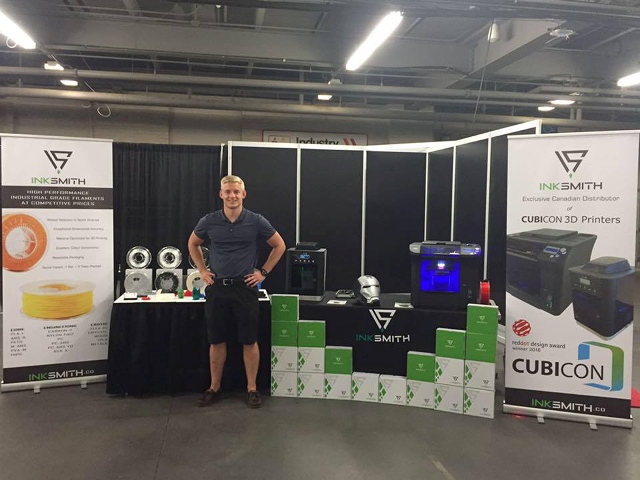
3D printing company testing bioplastics
December 6, 2016
By Kelly Daynard / AgInnovation Ontario
Dec. 6, 2016 - As an international development student at Wilfrid Laurier University in Waterloo, Ont., Jeremy Hedges was always interested in companies that showed leadership in environmental innovation.
 Inksmith owner Jeremy Hedges is using polylactic acid
Inksmith owner Jeremy Hedges is using polylactic acid One year after graduation, this entrepreneur is the owner of Inksmith, a Kitchener, Ont.-based 3D printing company rapidly becoming recognized for its leading-edge work in incorporating bioplastics in its technology.
Inksmith is a full service 3D printing bureau for 3D printing, selling 3D printers and filament as well as printing and design services. 3D printing is a technology that prints – or makes – three dimensional solid objects from a digital file, using plastics (or spools of filament) as their medium.
In April 2016, the company was selected to be one of five teams in the Google for Entrepreneurs program. This gives the Inksmith team access to mentorship from Google engineering, marketing and PR experts – all great resources for a new business.
The potential is great and its early success is testament to that.
“It’s been a pretty crazy start up for us,” says Hedges.
In InkSmith’s first month of business, they sold out of printers and nearly cleared their inventory of materials. Hedges is now working to hire more staff to keep up with the demand.
His goal is to push the business towards being 100 per cent agricultural based and he’s looking to bioplastics to make that vision a reality.
They’ve been testing plant-based resins and are now using polylactic acid (PLA), a corn or soybean based biodegradable plastic, for their prototyping contracts.
“We use PLA as much as we can,” he says.
But, working with the biodegradable product is not without its challenges. Testing of an early type of resin resulted in the layers failing after they had been printed. So, they’ve gone back to do more research, hoping that they’ll find a blend that will work for high volume applications.
Using recycled plastics is also something that the company has explored, but Hedges has found that recycled materials don’t hold their characteristics as they degrade, making them unusable for filament for his printers.
Hedges believes that all aspects of his business should be environmentally friendly. As such, he’s also partnered with Trees for the Future – a tree-planting program in Sub-Saharan Africa. Through that initiative, he’s committed to planting five trees for each kilogram-sized spool of filament that he sells. With business of 500 to 750 spools each month, Inksmith could be responsible for the planting of almost 200,000 trees each year.
“Companies can and should give back,” Hedges said simply when asked about his company’s philosophy.
Learn more at www.aginnovationontario.ca/en/
Print this page